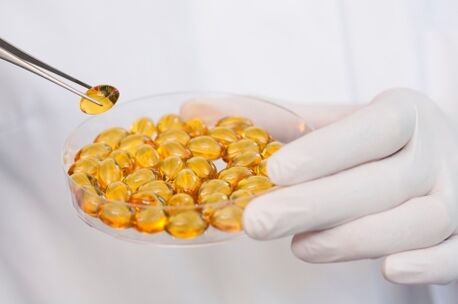What is Lipoic Acid? It is a pale yellow powder with a bitter taste that can be easily confused with hundreds of other chemicals. However, it is the unique qualities of this unusual combination of fatty acids and sulfur that draw your attention to lipoic acid: it promotes weight loss, provides more energy to the body, protects the brain, and possiblythe key opens the door. for mankind to the land of eternal youth. . . Interesting?

Lipoic acid is known to enhance the effectiveness of exercise for weight loss. What can it do for the body?
Lipoic Acid: Detergent or Special Forces?
Lipoic acid, also known as LA, it's also thioctic acid, it's also lipamide, it's also vitamin N which often appears under the name of a semivitamin or vitamin.
The fact that LA is synthesized by the human body prevents her from being a "complete" vitamin. Interestingly, lipoic acid is soluble in both fat and water, while its other peers in "vitamin activity" can only boast a comfortable living environment.
Lipoic acid is real. Figaro: it's here, it's there. By accompanying enzymatic reactions in the mitochondria, it makes the cell's energy acquisition process as efficient as possible.
Lipoic acid molecules - miniature recycling plants. This substance "takes" the breakdown products of amino acids and allows you to squeeze out of them the absolute maximum of those that our body needs, and then remove all the "waste stone" from the body.
In recent years, doctors have begun to seriously talk about lipoic acid as the future panacea of eternal youth, since it is this substance that in experiments has proven its ability to prevent DNA damage, recognized as the real cause of cellular aging and the extinction of vital functions.

Lipoic acid and weight loss: why it works
Lipoic acid can "overpower" the forces that cause us to gain weight and retain excess fat. Its activity in this capacity is multifaceted. So, when it comes to weight loss, lipoic acid:
affects the brain regions responsible for appetite, reduces hunger;
stimulate energy expenditure;
increased insulin sensitivity;
improves the quality of glucose absorption by cells, reduces its level in the blood;
reduces the tendency of the liver to accumulate fat.
Practice shows that lipoic acid gives the best results in weight loss combined with dietary changes and physical activity. There is a reasonable explanation for this. With the "change in process" of the diet, chemical changes occur in the body (most evident when following a protein, palo or keto diet, for the fastest results and effects. most notable side effects), and with increased strength and cardiovascular exercise, microtraumas occur in the muscle.
As a result, oxidation takes place aggressively in the body, causing a "spike" in the formation of free radicals, damaged molecules.
So, lipoic acid can not only neutralize them, but can also absorb them, and then - recover and plunge into the antioxidant fight again.
This is another unique quality of lipoic acid: it is the only "reusable" antioxidant.
In addition, vitamin N has a friendly conformation: lipoic acid can cooperate with other substances against free radicals (vitamins C and E, as well as glutathione) and even enhance the activity of its allies. it.
Is alpha lipoic acid the first acid?
For the first time, researchers extracted lipoic acid from bovine liver cells in the 1950s. So, alpha-lipoic acid for weight loss began her "medical career" as a liver protectant. However, scientists began to discover more and more new properties of an amazing substance, and in addition, they learned to synthesize it quite qualitatively under laboratory conditions.
Chemists today produce for various purposes two chemically "mirror-like" variants of lipoic acid - R ("right isomer") and S ("left isomer"). There are some differences in their molecular composition, and the human body only efficiently and almost completely assimilates the R-type of lipoic acid.
The latest methods can achieve higher drug purity and high concentrations of R-lipoic acid. It is clear that such a substance has great potential for all of the inherent properties of LA; In addition, it has been experimentally shown that it is the R isoform that increases the sensitivity of cells to insulin. However, it is quite expensive to produce a pure R variant of the substance, which, of course, affects the cost of the product.

The most common has become the more affordable alpha-lipoic acid, where the "right isomer" and "left isomer" are in equal proportions.
The product contains natural lipoic acid
viscera: kidney, heart, liver;
Vegetable: broccoli, spinach, Brussels sprouts, peas, tomatoes;
Other sources: brewer's yeast, brown rice.
When your strength is not enough
Many living organisms (including humans) are able to synthesize a certain amount of lipoic acid on their own - this explains the fact that high concentrations of this useful substance are found in the internal organs of animals.
Alas, you don't have to rely entirely on LA's food sources: as American functional nutritionist Dr. Jeffrey Webb explains, our enzymes can't "break" the bonds between alpha acidslipoic acid and the amino acid lysine, in which lipoic acid moves around the digestive tract in the form of food. Therefore, from a dinner rich in ALA, we will only get crumbs of the valuable substance.
The question arises: if humans can only produce a modest amount of lipoic acid, and with food they can get even less, as we have lived until now, until the doctorsDid you learn how to synthesize it?
The answer is simple: happy organisms that do not suffer from metabolic disorders, are not prone to obesity and do not accumulate total free radicals, are perfectly capable of absorbing the amount of free alpha-lipoic acid. But the deterioration of the ecological situation and the rapid deterioration of dietary habits in the 21st century have made lipoic acid stand out.
If you need the help of a substance that is simultaneously an antioxidant, water- and fat-soluble vitamins, a promoter of lipid metabolism and, as a bonus, a protector against degenerative brain diseases - go for it! Discuss with your doctor the possibility of taking alpha-lipoic acid supplements as a food supplement.
Lipoic acid: how much to drink?
The standard recommendation your doctor can give you for alpha-lipoic acid as a support and tonic is 25 to 50 mg per day. But that can vary depending on the intended use of the vitamin-like substance and the health status of the "host".
People who do a lot of sports to lose weight can be prescribed to "eat" 100-200 mg of alpha-lipoic acid, often as part of complex preparations that also contain L-carnitine (levocarnitine). LA enhances the "fat-burning" effect of this natural anabolic.
It should not be forgotten that such supplements are taken in courses with a strict time limit, so that the body is not "accustomed" to the constant absorption of substances that stimulate metabolism and do not causeWithdrawal syndrome, full body rejection. to self-produce these substances.
Because lipoic acid has the ability to maintain insulin action and even take over part of its function in some processes and reactions, diabetics are often prescribed higher doses, ranging from 400 mg of LA per day.
Renowned neuroscientist David Perlmutter, author of The Brain Nutrition Diet, considers 600 mg of alpha lipoic acid a must-have for anyone interested in preventing neurodegenerative diseases and erasing the effectsof years of rapid carbohydrate abuse.
In recent US trials, alpha-lipoic acid, given at a dosage of 1, 800 mg daily for 20 weeks, resulted in a 9% decrease in body weight without dietary changes in patients. severe obesity.
In case you decide to spend money on the more advanced and expensive R-isomer of lipoic acid, the dosage should be halved due to its high bioavailability.
It should be borne in mind that for all the useful properties of lipoic acid, an overdose of it can cause indigestion and nausea, increased skin sensitivity and muscle pain, as well as a sharp drop in blood sugar. with all the accompanying "surprises" such as weakness, dizziness. and severe hunger.
Therefore, consult your doctor before going to the pharmacy to buy a giant can of lipoic acid for quick weight loss: a specialist will help determine its effective and safe dosage for you, your figure. and your health.
During the entire period of taking lipoic acid, alcohol is strictly contraindicated. For best absorption, supplements should be taken 60-30 minutes before a meal or at least an hour after a meal.
Noticeable and tangible results of taking this substance no earlier than after eight weeks.































